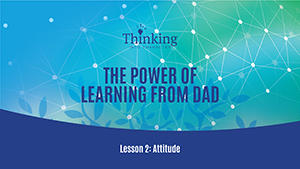Lesson 2: Attitude
Lesson 2 – Attitude – Part 1
“Our attitude toward life determines life’s attitude toward us.” – Earl Nightingale
In this lesson, Dr Selva Pankaj talks about the importance of attitude drawing on thinkers such as Earl Nightingale and Ralf Waldo Emerson.
Attitude is here defined as a collection of thoughts, feelings and actions that together determine our response to any given situation. Bob Proctor elaborates: Our attitude is the environment we carry with us during the day. It proclaims to the world what we think of ourselves and indicates the sort of person we have made up our minds to be.
Attitude is by far the primary determiner of your success. It is said, “Good attitude, good results. Poor attitude, poor results. Earn Nightingale famously wrote, “It is impossible to overestimate the number of opportunities missed because of poor attitude.” What opportunities can be gained then, simply by shifting our attitude?
This lesson will explore this question in particular by taking a deep dive into two more fundamental questions:
- What is your attitude?
- And how can you make modifications in your attitude to change your results?
Lesson 2 – Attitude – Part 2
“All that a man or woman achieves, or all the he fails to achieve, is a direct result of his or her attitudes.”- Earl Nightingale
A positive mental attitude is critical to success and it requires discipline. People sometimes misunderstand discipline. They take it to mean following commands or orders given by others. This is not at all the case. Discipline is not about someone telling you what to do, rather it is about giving yourself a command and following it.
As well as discipline, maintaining a good attitude requires the development of a growth mind-set. Research into the growth mindset derives from Prof. Carol Dweck and her team, who observed that people tend to have two distinct attitudes to abilities. On the one hand there is the view that abilities are incremental, on the other hand there is the view that abilities are fixed. Those with a growth mindset understand that abilities are incremental, which means that they understand that their abilities are correlated to the amount of effort and time that they put into developing them, much more so than it is with their “natural” dispositions or inclinations. The concept of the growth mindset has been adopted by high-net worth individuals such as Satya Nadella, CEO of Microsoft to achieve great success, and it is one Dr Selva has used successfully to scale his business.
Here, Dr Selva shares his own personal journey, on how he arrived at the concept of the growth-mindset, through his father and through his teacher and mentor, the late, professor Clay Christensen of Harvard Business School. Thus, it is the growth mindset and discipline as they relate to attitude, that have proved to Selva absolutely critical for success.
Here are three things you can do today to improve your attitude:
- Stay positive and look for the positive in others
- Shift gear if you spot that you are getting into a negative mindset
- Shift gear if you spot that you are getting into a negative mindset

